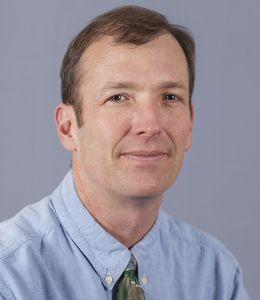
Scott E. Van Bramer, PhD
- Chair, Environmental Science and Sustainability
- Professor
- Science & Environment
Affiliated Programs
- Chemistry (BA/BS)
- Environmental Science & Sustainability (BS)
- Environmental Health & Sustainability Management (BA)
Education
- PhD, Chemistry (1992)
University of Colorado--Boulder (CO)
About Me
I attended Colorado College as an undergraduate and I conducted research in atmospheric chemistry. During graduate school at the University of Colorado in Boulder, my research interests changed to studying photodissociation using laser mass spectrometry. After graduate school, I taught at Lock Haven University for two years before starting at Widener University in 1994.
Over the first 10 years of my teaching career, I learned how different teaching strategies impact student learning. From what I read and from my own experiences, many undergraduate courses are designed to deliver content and teach students to follow directions. I do not, however, believe this is the purpose of an undergraduate education. I believe the purpose of an undergraduate education is to develop a mind that is engaged in asking questions and solving problems, critical thinking is the foundation of an undergraduate education.
As a faculty member, I want students to learn how to ask questions, how to work through complex multi-step tasks, and how to learn from mistakes. I want my students to develop critical thinking skills and dispositions so that they can hear criticism, reflect on that information, and then either defend their initial answer or change their mind. I want students to develop habits of thinking and knowing that help them solve complex questions and answer the question "how do you know?".
Research Interests
My area of expertise is in environmental analysis and instrumentation used for chemical analysis. As a result, my research projects cover a wide range of applications. Most recently I have focused on applications of mass spectrometry and NMR spectroscopy - two techniques for detecting and identifying chemicals. I am also actively engaged in the scholarship of teaching - focusing on new teaching strategies and the development of more effective ways to engage students in learning.
Media Expertise
- Environmental analysis
- Liberal education
- General education
Publications
- Saha, Dipendu; Barakat, Soukaina; Van Bramer, Scott; Nelson, Karl; Hensley, Dale; Chen, Jihua. Non-Competitive and Competitive Adsorption of Heavy Metals in Sulfur-functionalized Ordered Mesoporous Carbon. ACS Appl. Mater. Interfaces, 2016, 8(49), 34132-34142.
- Van Bramer, S.E., & Goodrich, K.R. (2015). Determination of plant volatiles using solid phase microextraction GC-MS. Journal of Chemical Education.
- Van Bramer, S.E., & Bastin, L.D. (2013). Using a progressive paper to develop students writing skills. Journal of Chemical Education, 90(6), 745–750.
Professional Affiliations & Memberships
American Chemical Society (ACS)
Awards
- Philadelphia Section ACS Award for Excellence in Undergraduate Teaching (2017)
- Faculty Institutional Leadership Award (2016)
- Distinguished University Professor (2014-2017)
